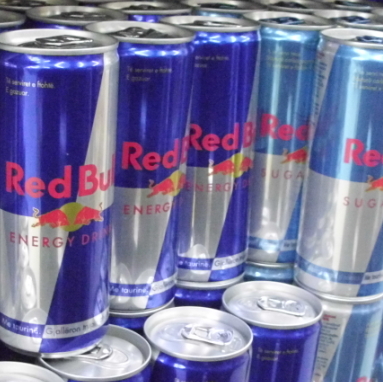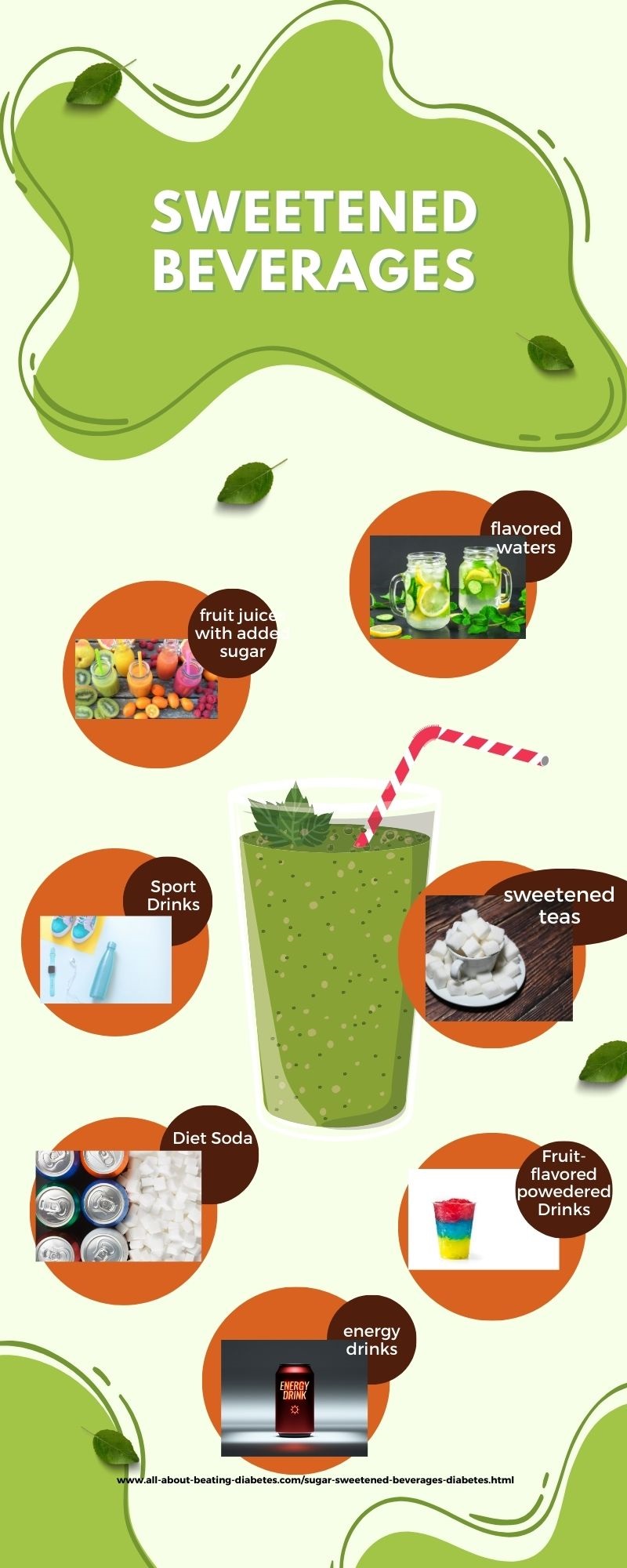Sugar-Sweetened Drinks Lead to Type 2 Diabetes!
- Home
- Your Diabetic Information Center
- Sugar Sweetened Beverages Diabetes

There is significant evidence suggesting that consumption of sugar-sweetened beverages can contribute to the development of type 2 diabetes.
Numerous studies have found a positive association between the intake of sugary drinks and the risk of developing this chronic metabolic disorder.
What do studies say on Sweetened Beverages?
Sugar-sweetened beverages, such as soda, fruit juices, energy drinks, and sweetened iced teas, are typically high in added sugars and calories.
These drinks can lead to weight gain and obesity, which are major risk factors for type 2 diabetes.
Excessive sugar intake can also increase insulin resistance, impair glucose metabolism, and negatively impact pancreatic function, all of which can contribute to the development of diabetes.
For example, a systematic review and meta-analysis published in the journal Diabetes Care in 2010 analyzed data from eight studies and found that individuals who consumed the highest amounts of sugary drinks had a significantly increased risk of developing type 2 diabetes compared to those with the lowest intake.
Another study published in the journal BMJ in 2015, which included data from over 300,000 participants, reported a positive association between sugary drink consumption and the risk of developing diabetes.
It's important to note that while sugar-sweetened drinks can increase the risk of developing type 2 diabetes, they are not the sole cause.
Other factors, such as genetics, lifestyle choices, overall diet, and physical activity levels, also play a role in the development of this condition.
To reduce the risk of type 2 diabetes, it is advisable to limit the consumption of sugar-sweetened beverages and opt for healthier alternatives like water, unsweetened tea, or naturally flavored infused water.
Additionally, maintaining a balanced diet, engaging in regular physical activity, and maintaining a healthy weight are all crucial in preventing the onset of type 2 diabetes.
Health implications of consuming sugary beverages
Following I'm going to share some important findings from a study conducted by the InterAct Consortium regarding the link between regular consumption of sugary drinks and the risk of developing type 2 diabetes.
These findings further support previous reports from North America.
While some of you may already be familiar with this study, I believe it is still worth sharing for those who may not have heard about it.
The study provides valuable insights into the potential health implications of consuming sugary beverages, particularly in relation to the development of type 2 diabetes.
Composition of sugary-added foods and beverages

Understanding the composition of the foods and beverages we consume is of utmost importance. It allows us to make informed decisions about what we supply our bodies with—whether it is beneficial nourishment or potentially harmful substances.
In this context, let's explore the findings of the aforementioned study without delving into intricate medical details but just on
WHAT'S INSIDE THE FOODS & JUICES YOU EAT & DRINK!
We must know what we are going to supply to our body needs: GARBAGE or GOODS?!
The study categorized sugary beverages as follows:
- Juices = 100% fruits and/or vegetables (or their concentrates)
- Nectars = Juices with 20% added Sugar
- Soft Drinks = (1) + (2)
(1) = Sugar Sweetened Soft Drinks
(2) = Artificially Sweetened Soft Drinks
It is worth noting that some substances, such as added sugar, are reported to be present in these drinks. These substances play a pivotal role in the ensuing health problems associated with their consumption.
The study revealed a significant finding—consuming twelve ounces of sugar daily increases the risk of developing type 2 diabetes by twenty-two percent.
Considering the recommendations by the American Heart Association, the weekly limit for sugar-sweetened beverage consumption is 36 ounces or 5 ounces per day.
To put it into perspective, if you choose to consume a soft drink, it is important to ensure that the total daily calorie intake from such beverages does not exceed 5 ounces:
36 ounces / 7 days = 5 ounces per day.
However, this can be challenging as sugar-added soft drinks often contain more calories than the recommended limit.
Hence, if you regularly consume these types of drinks, it becomes evident how you may be overloading your body with excess calories, unless you engage in physically demanding activities that require additional energy.
While no association was found between the consumption of juices and nectars and the risk of diabetes, it is crucial to focus on the "added substances"—sugar and artificial sweeteners—discussed earlier.
- Sugar, as glucose, is essential for our body's cellular processes. However, consuming excessive amounts of added sugar leads to an overload of calories. Consequently, more sugar is stored as fat than the body typically requires. This can result in the development of obesity and insulin resistance, as these two conditions often coexist.
- Artificial Sweeteners include Saccharin, Splenda, Aspartame, Sorbitol, Mannitol, AceSulfame-K. All of them are synthetically produced and possess carcinogenic properties.
Despite being labeled as "0 Energy," they are 100+ times sweeter than sugar. They can mislead our brain's ability to distinguish between sweetness and calorie content, leading to increased cravings for sugary foods.
Excessive consumption of artificial sweeteners may cause gastrointestinal issues such as diarrhea.
Additionally, they have the potential to create addiction, so you might become ADDICTED of artificial sweeteners.
- Stevia is the Natural and Safest alternative to Sugar.
In conclusion, our bodies require various types of nutrients, including sugars, proteins, fats, vitamins, minerals, etc., in the right quantities and at the appropriate times.
If you find it difficult to resist the temptation of a can of soda, it is advisable to limit its consumption to once or twice a week.
It is better to prepare your own juice with a teaspoon of added sugar each day than to opt for a can of soda.
Take a moment to reflect on these insights and consider the impact your choices may have on your health.
Dr.Alba
P.s. Do not forget to leave your COMMENTS below:
References:
References:
- Wang M, Yu M, Fang L, Hu RY. Association between sugar-sweetened beverages and type 2 diabetes: A meta-analysis. J Diabetes Investig. 2015 May;6(3):360-6. doi: 10.1111/jdi.12309. Epub 2014 Dec 11. PMID: 25969723; PMCID: PMC4420570.
- Malik, V. S., Popkin, B. M., Bray, G. A., Després, J. P., & Willett, W. C. (2010). Sugar-sweetened beverages, obesity, type 2 diabetes mellitus, and cardiovascular disease risk. Circulation, 121(11), 1356-1364.
- Imamura, F., O'Connor, L., Ye, Z., Mursu, J., Hayashino, Y., Bhupathiraju, S. N., ... & Forouhi, N. G. (2015). Consumption of sugar sweetened beverages, artificially sweetened beverages, and fruit juice and incidence of type 2 diabetes: systematic review, meta-analysis, and estimation of population attributable fraction. BMJ, 351, h3576.
- Malik, V. S., Li, Y., Pan, A., De Koning, L., Schernhammer, E., Willett, W. C., & Hu, F. B. (2014). Long-term consumption of sugar-sweetened and artificially sweetened beverages and risk of mortality in US adults. Circulation, 139(18), 2113-2125.
- Johnson, R. K., Appel, L. J., Brands, M., Howard, B. V., Lefevre, M., Lustig, R. H., ... & Wylie-Rosett, J. (2009). Dietary sugars intake and cardiovascular health: a scientific statement from the American Heart Association. Circulation, 120(11), 1011-1020.
- de Koning, L., Malik, V. S., Kellogg, M. D., Rimm, E. B., Willett, W. C., & Hu, F. B. (2012). Sweetened beverage consumption, incident coronary heart disease, and biomarkers of risk in men. Circulation, 125(14), 1735-1741.
Related Topics:
Diabetes complications Questions or Problems? Get Help Here
This is the place where you can ask a question about any aspect of diabetes complications.
It's free and it's easy to do. Just fill in the form below, then click on "Submit Your Question".